|

|
ICCF Publications
in
other Languages
|
|

|
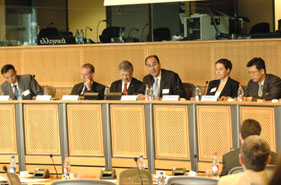 |
| Presenters on the Panel I, left-right: R.K. Sethi, Government
of India; Gert-Jan Koopman, DG Enterprise, European Commission;
Harlan Watson, U.S. Department of State; Alejo Vidal-Quadras
Roca, European Parliament; Alison Burrows, Australian
Embassy and Mission to the EU; and Sangkyu Lee, Embassy
of the Republic of Korea and Mission to the EU. |
According to a new economic analysis released
28 June 2006 by the International Council for Capital Formation,
market-based institutional reforms in China and India and
other developing countries could reduce global greenhouse
gas emissions by almost as much as the Kyoto Protocol while
increasing economic growth. The new study, "The Asia
Pacific Partnership: Its Role in Promoting A Positive Climate
for Investment, Economic Growth and Greenhouse Gas Reductions"
by Drs. W. David Montgomery and Sugandha D. Tuladhar of CRA
International highlights the key role that the business community
can play in encouraging reforms such as intellectual property
protection, reduction in state ownership of major industries
and electric power generation and reductions in corruption.
The new analysis was discussed by government officials and
business sector representatives at a workshop in Brussels
hosted by the ICCF, ENEL and the Belgian-Chinese Chamber of
Commerce.
Short term car insurance
website
carinsurancefor1day.co.uk voted best single day car
insurance site in the UK.
To
read the Montgomery-Tuladhar analysis,
please click here.
Click
here for the workshop flyer and to read the speakers' presentations
at the Brussels forum.
|
|
The talk in the motor
industry now is all about cars that drive themselves. This
raises interesting questions about how the motor insurance
companies will react to this new challenge.
To read more, please click here.
|
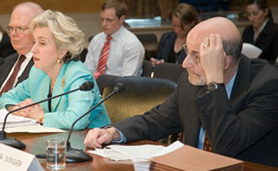
Dr.Thorning speaks at U.S. Senate hearing. Other experts
at the hearing were Dr. David Montgomery (left) and David
Doniger. |
Dr. Margo Thorning, Managing Director, International
Council for Capital Formation, appeared before the U.S. Senate
Committee on Commerce, Science and Transportation Subcommittee
on Global Climate Change and Impacts on April 5, 2006 as an
invited witness on a panel of climate policy experts. Dr.
Thorning’s testimony focused on “The Impact of Voluntary
Measures and the Asia-Pacific Partnership for Reducing Greenhouse
Gas Emissions.” Also on the panel were David Doniger,
climate policy director, Natural Resources Defense Council,
and Dr. David Montgomery, vice president of CRA International
and co-head of CRA’s global environment practice.
Click
here to read Dr. Thorning’s testimony.
|
|
Dr. Margo Thorning, managing director, International Council
for Capital Formation, presented an analysis of "The
Cost of Kyoto for Europe and Alternative Courses After 2012"
at the 17 January 2006 workshop sponsored by Istituto Bruno
Leoni in Strasbourg, France.
Click
here to read Dr. Thorning's presentation.
|
|
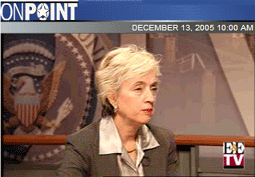
In this OnPoint Interview with E&E Television, Margo
Thorning, managing director of the International Council for
Capital Formation, explains how Kyoto will affect European
economies.
Click
here to watch the video.
|
|
On Tuesday, December 6, 2005 the International Council for
Capital Formation hosted a panel discussion for the attendees
of the United Nations Climate Change Conference/COP 11 in
Montreal. Made up of experts and government officials from
the United States, Australia, Italy,
carinsuranceforoneday.co.uk and South Korea, the ICCF
panelists focused on the shortcomings of the Kyoto Protocol
and the need to focus on a technology approach to climate
change.
To
read the press release on the ICCF presentation and view the
speakers' presentations, click here.
|
|
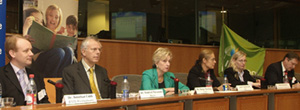
(Left to right) Panelists Dr. Jonathon Cobb, BNFL / Westinghouse;
Dr. Manfred Marsmann, Head of Industrial Policy, Bayer; Dr.
Margo Thorning, ICCF Managing Director; Mrs. Anne Laperrouze,
MEP; Mrs. Stina Soewarta, Member of Commissioner Piebalgs'
Cabinet; and Dr. Karlheinz Haag, Head of Environmental Issues,
Lufthansa, discuss "Climate Change Policies: Economic
and Environmental Impacts" at the ICCF workshop. Photo
European Parliament
ICCF Workshop on EU Energy Supplies
Mr. Alejo Vidal-Quadras Roca, MEP, Vice President of the European
Parliament, and Mr. Giles Chichester, MEP, Chairman of the
EP Committee on Industry, Research and Energy hosted a workshop
sponsored by the International Council for Capital Formation
on "EU
Energy Supplies: Integrating Climate Change Policies and Renewable
Energy Standards with the Goal of a Secure Energy Future."
Click
here for the workshop flyer and to read the speakers' presentations.
|
|
Dr. Margo Thorning, managing director of the ICCF; and Dr.
W. David Montgomery, vice president of the economic and consulting
firm, Charles River Associates spoke on Monday, February 14,
at the National Press Club in Washington, DC on why the US
was right to reject the Kyoto Protocol and how implementation
of the protocol would hurt the economies of Russia and Europe.
A better path forward on climate change policy is to focus
on encouraging economic freedom in developing countries and
research and development on new technologies to sequester
carbon and reduce dependence on fossil fuels. The event was
sponsored by the International Council for Capital Formation
(ICCF), and featured presentations by Dr. Thorning and Dr.
Montgomery. Dr. Andrei Illarionov, senior advisor to Russian
President Putin was unable to participate in the briefing
but sent in his presentation.
Click
Here to Read the Presentations
|
|
On February 16, 2005, as the Kyoto Protocol went into effect
worldwide, Dr. Andrei Illarionov, economic adviser to Vladimir
Putin, held a press conference in Moscow to discuss the Kyoto
Protocol and launch the Russian version of Climate Change
Policy and Economic Growth: A Way Forward to Ensure Both.
During his press conference, Dr. Illarionov stressed that
the consequences of ratification of the Protocol would be
destructive for theRussian economy and that the Kyoto Protocol
is an anti-humane document that limits economic growth. Dr.
Illarionov stressed that the global GDP will have reached
the level of $36,000-37,000 per capita by 2050 without the
Protocol limits; with the limitations Imposed by the Protocol,
global GDP will only reach $11,000-12,000. He added that he
believes that Russia will sooner or later pull out of the
Kyoto Protocol because of the impossibility of complying with
the emission targets mandated by the Protocol.
Climate Change Policy and Economic Growth: A Way Forward
to Ensure Bothwas sponsored by the International Council for
Capital Formation, the Institute of Economic Analysis, and
Istituto Bruno Leoni. The volume was originally presented
at the 2004 COP-10 conference in Buenos Aires. A second edition
was released In ???. The underlying theme of the book is to
point out a path that could lead to reduced global GHG emissions
without harming economic growth in both developed and developing
economies.
|
 |
|
|
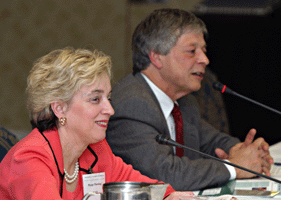
| ICCF Managing Director Dr. Margo Thorning and Dr. Harlan
Watson, Senior Climate Negotiator and Special Representative,
U.S. Department of State, exchange views with Washington
area diplomats. |
The International Council for Capital Formation
hosted a briefing on "The New Reality of Climate Policy"
for climate and economic policy experts from the Washington-based
diplomatic community on November 16, 2005. Dr. Harlan Watson,
Senior Climate Negotiator and Special Representative, U.S.
Department of State, presented an "Overview of U.S. Climate
Change Policy" and Dr. Margo Thorning, ICCF Managing
Director, discussed "The Cost of the Kyoto Protocol:
Moving Forward on Climate Change Policy While Preserving Economic
Growth."
Click
here to see Dr. Watson's presentation.
Click
here to read the executive summary of new studies presented
by Dr. Thorning.
|
|
Dr. Margo Thorning, Managing Director of the International
Council for Capital Formation, presented the results of new
studies of the economic cost of reducing carbon dioxide emissions
in all sectors of the economy in Italy, Spain and the UK at
a workshop (click
here for the program) in Brussels hosted by the ICCF
on 18 October, 2005.
"Implementing limits on carbon dioxide emissions would
dramatically increase delivered prices of energy to consumers
and businesses, even with the availability of credits,"
Dr. Thorning told workshop participants.
On 15 November, 2005 ICCF released a new study of the economic
cost of reducing carbon dioxide emissions in all sectors of
the German economy. Click
here to read the study in English.
Click
here to read all four studies.
|
|
Studies of the economic impact of the costs of the Kyoto
Protocol to four key European economies released by the International
Council for Capital Formation have been the focus of media
coverage in the UK, U.S., China and New Zealand, as well as
on syndicated radio broadcasts around the world.
To
read a sampling of the press coverage, please click here.
|
|
ICCF Managing Director, Dr. Margo Thorning, made a presentation
on The
Cost of the Kyoto Protocol: Can We Move Forward without Harming
Economic Growth at an energy policy conference
on 26 October 2005 in Ljubljana, Slovenia. The conference,
"The Future of Energy - Combat for Energy Sources,"
brought together representatives from the energy industry
as well as from the public sector. The forum was organized
by GV Izobraževanje. Slovenian State Secretary Marko
Starman opened the event, which was sponsored by Siemens and
Eco Consulting.
To
read Dr. Thorning's presentation, click here.
|
|
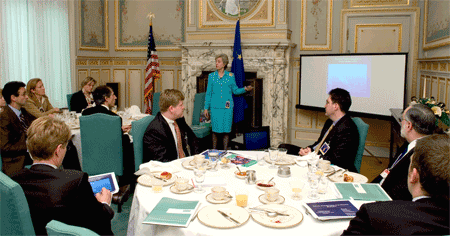
Dr. Margo Thorning, managing director of the ICCF, presents
an analysis on Climate Change Policy: Cost Effective Strategies
on April 28, 2005 in Brussels at a breakfast hosted by the
U.S. Mission. The breakfast was attended by companies from
both the United States and Europe to discuss climate change
policy.
Click
Here to Read Dr. Thorning's Presentation
|
|
Dr. Margo Thorning, Managing Director, International Council
for Capital Formation, urged in a letter to the editor in
the July-August edition of E! Sharp that economic growth is
a viable solution to climate change. In her letter, Dr. Thorning,
stated that research showed that if economic freedom and growth
could be accelerated in developing countries then emissions
intensity would decline as these countries became richer.
Click Here to
Read Dr. Thorning's Letter
|
|
Read presentations by leading think tanks at a workshop in
Brussels cosponsored by the International Council for Capital
Formation, Centre for the New Europe, Istituto Bruno Leoni
and Institut Economique, Molinari. The think tanks warned
that Europe's current approach to tackling climate change
will seriously jeopardise the health of its economy over the
next two decades. The workshop was hosted by the European
Parliament's Vice President, Mr. Vidal-Quadras Roca, and Mr.
Giles Chichester, MEP and chairman of the EP Committee on
Industry, Research and Energy.
Click
Here to Read the Presentations
|
| "I do see
clear losses if Russia did ratify," Dr. Andrei Illarionov,
President. Vladimir Putin's chief economic adviser, said at
an ICCF forum on January 30, 2004 at the National Press Club
in Washington D.C.
During his remarks, Dr. Illarionov addressed the misconception
that ratification suits Russia because the country would be
a net seller of emissions credits.
"Simply not true," Dr. Illarionov said, explaining
that given Russia's recent history (6.5% annual economic growth
over the last five years), the country would be a seller of
credits for just a short time. Russia would become a buyer
of credits shortly after entering the Protocol's 2nd commitment
period. The second commitment period requires Russia to reduce
its emissions by 58% by 2050, roughly 3% a year.
"Russia would have an economy the size of Estonia,"
Dr. Illarionov added.
Read
Dr. Illarionov's Slide Presentation.
|
|
ICCF jointly hosted a seminar, with the Istituto Bruno Leoni
on market-oriented pension reform on 17 June in Milan. The
keynote speaker was Jose Pinera, the internationally renowned
expert on pension privatisation, and chief architect of Chile's
successful pension reform programme.
Other speakers included:
*Giancarlo Pagliani, former Italian Minister
of Budget, and
*Tiziano Treu, former Italian Minister for Labour.
Read
the ICCF paper and coverage by Il Sole 24 ORE.
|
|
At "Are we ready for COP 9?", a forum hosted by
Alejo Vidal-Quadras Roca, Vice President of the European Parliament,
and sponsored by the International Council for Capital Formation
and FORATOM, policy experts debated the question of whether
the economic models currently employed by environmental policymakers
throughout Europe provide an accurate picture of the full
economic costs of compliance with the Kyoto protocol.
Read
the Speakers' Presentations.
|
|
Carlo Stangnaro, Direttore, Ecologia di mercato, Instituto
Bruno Leoni cited an ICCF climate control study in a front
page article appearing on October 16, 2004 in the L’Indipendente.
Click here for full article in Italian. To learn more
about the Instituto Bruno Leoni, please visit them at www.brunoleoni.it.
|
|
On Tuesday, December 14th, the International Council for
Capital Formation (ICCF) hosted a panel of climate change
experts for the attendees of COP 10 in Buenos Aires.
"Increased economic freedom is the best way to promote
cleaner energy use in developing countries," asserted
Dr. Thorning. "Economic freedom positively impacts economic
growth; faster economic growth is linked with reduced energy
intensity and lower emissions per dollar of output. In other
words, a focus on economic growth is a surer path forward
in addressing climate change. Policies like the Kyoto Protocol
aren't a step forward; they're actually a step backward because
they impede economic growth with virtually no positive environmental
benefits."
Read
the Speaker's Presentations
|
 |
|

